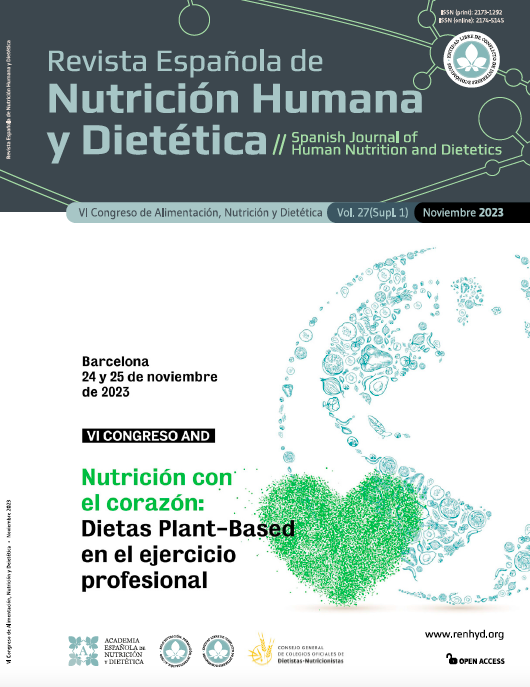Alimentos vegetales fermentados como fuente alternativa de probióticos a la dieta
Palabras clave:
-Resumen
-
Citas
(1) Marco ML, Heeney D, Binda S, et al. Health benefits of fermented foods: microbiota and beyond. Curr Opin Biotechnol. 2017; 44: 94-102. doi: 10.1016/j.copbio.2016.11.010.
(2) Hill C, Guarner F, Reid G, et al. Expert consensus document. The International Scientific Association for Probiotics and Prebiotics consensus statement on the scope and appropriate use of the term probiotic. Nat Rev Gastroenterol Hepatol. 2014; 11(8):506-14. doi: 10.1038/nrgastro.2014.66.
(3) Oliveira G, González-Molero I. Actualización de probióticos, prebióticos y simbióticos en nutrición clínica. Endocrinol Nutr. 2016; 63(9): 482-94.
(4) Tomasik P, Tomasik P. Probiotics, Non-Dairy Prebiotics and Postbiotics in Nutrition. Applied Sciences. 2020; 10(4): 1470. https://doi.org/10.3390/app10041470.
(5) Guarner F, et al. Guías Mundiales de la Organización Mundial de Gastroenterología - Probióticos y prebióticos. 2017.
(6) Dahiya D, Nigam PS. Probiotics, Prebiotics, Synbiotics, and Fermented Foods as Potential Biotics in Nutrition Improving Health via Microbiome-Gut-Brain Axis. Fermentation. 2022; 8(7):303. https://doi.org/10.3390/fermentation8070303.
(7) Dimidi E, Cox SR, Rossi M, Whelan K. Fermented Foods: Definitions and Characteristics, Impact on the Gut Microbiota and Effects on Gastrointestinal Health and Disease. Nutrients. 2019; 11(8):1806. Published 2019 Aug 5. doi: 10.3390/nu11081806.
(8) Salminen S, Collado MC, Endo A, et al. The International Scientific Association of Probiotics and Prebiotics (ISAPP) consensus statement on the definition and scope of postbiotics [published correction appears in Nat Rev Gastroenterol Hepatol. 2021 Jun 15] [published correction appears in Nat Rev Gastroenterol Hepatol. 2022 Aug; 19(8): 551]. Nat Rev Gastroenterol Hepatol. 2021; 18(9): 649-67. doi: 10.1038/s41575-021-00440-6.
(9) Taylor BC, Lejzerowicz F, Poirel M, et al. Consumption of Fermented Foods Is Associated with Systematic Differences in the Gut Microbiome and Metabolome. mSystems. 2020; 5(2): e00901-19. Published 2020 Mar 17. doi: 10.1128/mSystems.00901-19.
(10) Shahbazi R, Sharifzad F, Bagheri R, Alsadi N, Yasavoli-Sharahi H, Matar C. Anti-Inflammatory and Immunomodulatory Properties of Fermented Plant Foods. Nutrients. 2021; 13(5): 1516. Published 2021 Apr 30. doi: 10.3390/nu13051516.
Descargas
Publicado
Cómo citar
Número
Sección
Licencia
Derechos de autor 2023 Anna Paré Vidal

Esta obra está bajo una licencia internacional Creative Commons Atribución-NoComercial-CompartirIgual 4.0.











